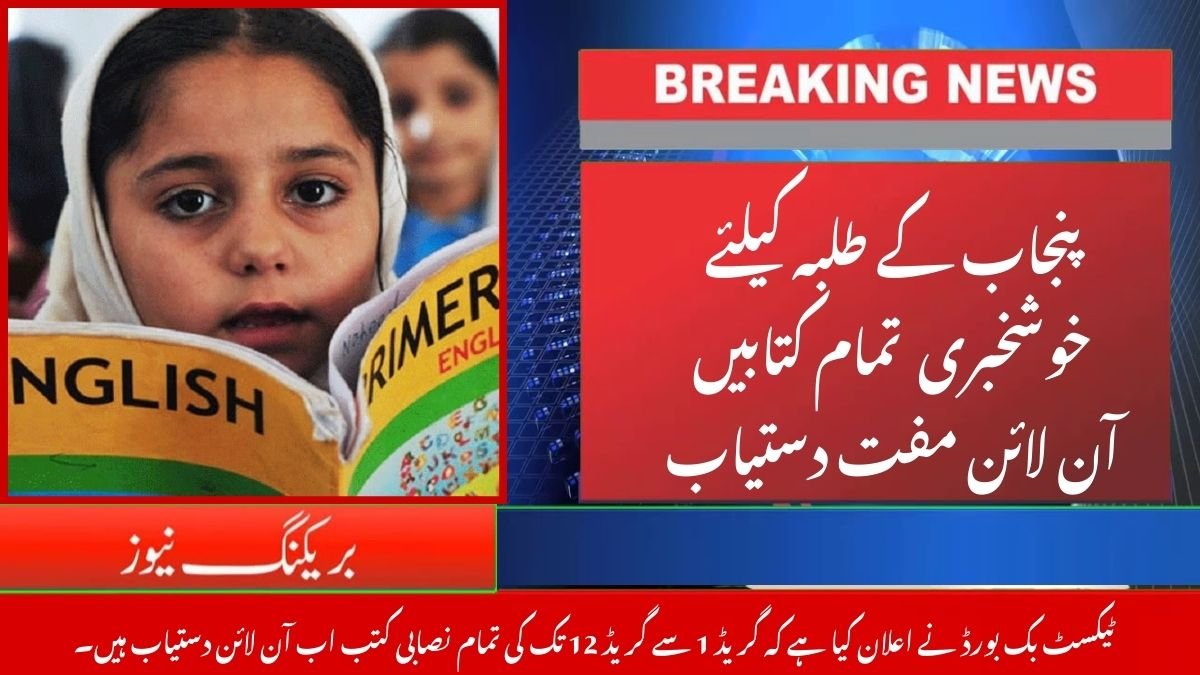LAHORE: In a landmark move for students across Punjab, the Punjab Curriculum and Textbook Board (PCTB) has announced that all textbooks from Grade 1 to Grade 12 are now available online — completely free of cost.
The decision, made official in September 2025, is being welcomed as a huge relief for parents and students who for years struggled with late deliveries, expensive editions, or unavailability of books in local markets.
Why This Matters for Students
For many families in Punjab, arranging course books at the start of the academic year has always been a headache. Prices kept rising, pirated versions filled markets, and in remote areas, children often had to start classes without books.
With the new initiative, every student can simply log on to the PCTB portal, select their grade, choose Urdu or English medium, and download the required subject in PDF format. No middlemen, no extra costs.
“This is a blessing for us,” said Ayesha, a parent from Multan. “Earlier, I had to spend thousands on my children’s books. Now I can just download them and print if needed.”
Key Features of the Free Textbook Initiative
| Feature | Details |
|---|---|
| Classes Covered | Grade 1 to 12 |
| Subjects Available | Urdu, English, Islamiat, Mathematics, Science, Social Studies, Physics, Chemistry, Biology, Computer, Economics, and more |
| Languages | Urdu & English Medium |
| Access Method | Download from official PCTB portal |
| Cost | 100% Free |
| Format | PDF (printable) |
This facility is expected to directly benefit millions of students, especially those from rural districts where bookshops are few and far between.
Digital Learning Boost
The move also ties in with Punjab’s broader vision of shifting towards digital learning. Alongside PCTB’s official portal, other platforms are helping students:
-
eLearn Punjab – provides not just books but interactive content like video lectures and animations.
-
Ustad360 and Taleem360 – private portals that organize PCTB books by grade and subject, offering easy downloads.
Teachers say such resources can make difficult topics — especially in science and mathematics — easier to understand through visual examples.
Benefits for Families
The decision is being described as a “game-changer” by education experts because it solves multiple problems at once:
-
No more shortage: Books are available 24/7 online.
-
Less burden on parents: Families can save thousands in book costs.
-
Equal access: Students in cities and villages now have the same opportunity.
-
Better preparation: Students can start studying even before classes begin.
Remaining Challenges
While the initiative is positive, not every household is ready for digital-only learning. Some issues remain:
-
Internet access – Villages with weak or no internet still face barriers.
-
Lack of devices – Many students do not own smartphones, laptops, or printers.
-
Piracy risks – Third-party websites may share outdated or wrong versions of textbooks.
Experts stress that the government must also work on expanding internet coverage and setting up digital libraries in schools to ensure no child is left behind.
Voices from the Ground
Teachers welcome the move but want proper training programs for both teachers and students on using digital books. “Books alone are not enough; we need to teach children how to benefit from them digitally,” said a Lahore schoolteacher.
Students themselves see this as a relief. “I don’t need to run around Urdu Bazaar anymore,” said Hamza, a 10th grader. “Now I can just download my science book at home.”
Parents, too, are happy with reduced expenses. With education costs rising every year, the free availability of textbooks is seen as a genuine support for struggling families.
Also read
Conclusion
The Punjab Curriculum and Textbook Board’s decision to provide free online textbooks from Grade 1 to 12 is not just a policy shift, but a step toward modernizing the province’s education sector.
If supported with better internet facilities, affordable digital devices, and teacher training, this initiative could help Punjab catch up with international standards of e-learning. For now, it has already solved one of the most common frustrations for parents and students: the never-ending hunt for affordable textbooks.



